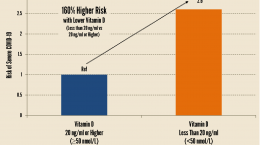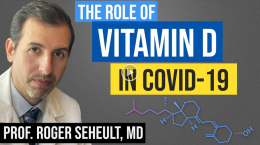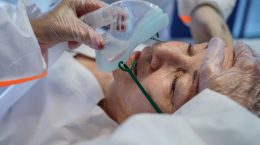Published on October 17, 2021
Deficiencies of vitamin K and vitamin D found to be independently and significantly associated with increased COVID-19 severity
Key Points
- There are two forms of vitamin K. Vitamin K1 (called phylloquinone) is found in leafy greens and is essential for blood clotting. Vitamin K2 (called menaquinones) is mostly bacterial in origin, and is high in fermented foods such as sauerkraut, natto, and kimchi, high fat dairy from grass-fed cows, eggs, and animal organs.
- Vitamins D and K work synergistically as co-factors for several processes within the body
- Many studies have shown a strong correlation between vitamin D and COVID-19 disease risk, severity, and death
- A new study looked at vitamin D and vitamin K status among SARS CoV-2 positive patients whose COVID-19 disease presentation varied from asymptomatic to life-threatening and/or death; both vitamin K deficiency and vitamin D deficiency were independently associated with worse COVID-19 disease severity, even after adjusting for demographics and comorbidities.
 Vitamin D and vitamin K are fat soluble vitamins, both essential for bone health, heart health, and the regulation of inflammation. There are two forms of vitamin K. Vitamin K1 (called phylloquinone) is found in leafy greens and is essential for blood clotting. Vitamin K2 (called menaquinones) is mostly bacterial in origin, and is high in fermented foods such as sauerkraut, natto, and kimchi, high fat dairy from grass-fed cows, eggs, and animal organs. Vitamin K2 is also synthesized by the bacteria in the gut. The main forms of vitamin K2 are MK4 and MK7.
Vitamin D and vitamin K are fat soluble vitamins, both essential for bone health, heart health, and the regulation of inflammation. There are two forms of vitamin K. Vitamin K1 (called phylloquinone) is found in leafy greens and is essential for blood clotting. Vitamin K2 (called menaquinones) is mostly bacterial in origin, and is high in fermented foods such as sauerkraut, natto, and kimchi, high fat dairy from grass-fed cows, eggs, and animal organs. Vitamin K2 is also synthesized by the bacteria in the gut. The main forms of vitamin K2 are MK4 and MK7.
Vitamins D and K2 Work Together
Vitamin K2 works synergistically with vitamin D, and both act as co-enzymes. They work together as co-factors in several processes, and vitamin K2 intake seems to have an influence on vitamin D levels. A GrassrootsHealth analysis showed that on average, those taking supplemental vitamin K2 have a higher vitamin D level for any given vitamin D intake amount than those not taking supplemental vitamin K2. Specifically, 115% more supplemental vitamin D was needed for 50% of the population to achieve 40 ng/ml (100 nmol/L) for those not taking supplemental vitamin K2 compared to those who took 200 mcg/day or more.
A video by Dr. John Campbell reviews the scientific evidence on the combined effects of vitamins D and K2. Studies covered in the video show a relationship between vitamin K2 and the prevention of osteoporosis, reduced risk of coronary heart disease, decreased bone loss, improved dental health (with a greater effect seen among those also supplementing with vitamin D) and even liver and prostate cancer.
Recent Study Explores Relationship between Vitamins D, K, and COVID-19
An observational study by Desai et al. looked at vitamin D and vitamin K status among SARS CoV-2 positive patients whose COVID-19 disease presentation varied from asymptomatic to life-threatening and/or death. Disease severity was categorized as follows:
Mild: Mild disease, no need for medical assistance to moderate disease with no need for oxygen therapy
Moderate: Moderate disease requiring oxygen therapy to severe disease needing non-invasive oxygen therapy
Severe: Severe disease needing any form of invasive ventilation, to death
Blood samples collected within the first 7 days of symptoms were used to measure vitamin K and vitamin D status. Circulating dephosporylated uncarboxylated matrix Gla protein (dp-ucMGP) level was used to measure vitamin K status, since direct measurement of vitamin K in the blood is not possible. High dp-ucMGP levels are known as the best marker of low vitamin K status. For this analysis, dp-ucMGP levels greater than 897 ng/ml were considered a low vitamin K status, 520-897 ng/ml mid vitamin K status, and below 520 ng/ml was considered a high vitamin K status.
For this particular analysis, vitamin D levels greater than 30 ng/ml (75 nmol/L) were considered optimal, 20-30 ng/ml (50-75 nmol/L) insufficient, and less than 20 ng/ml (50 nmol/L) deficient.
What did the study find?
A total of 100 SARS-CoV-2 positive participants and 50 age and sex matched healthy controls were included in the analysis.
– 34 were categorized as Mild disease (4 asymptomatic, 30 symptomatic)
– 51 as Moderate
– 15 as Severe (8 required mechanical ventilation, and 7 deaths)
How did vitamins D and K relate to COVID-19 severity?
Vitamin K status was worse (as indicated by higher dp-ucMGP levels) among COVID-19 positive individuals, and was also significantly and independently associated with chronic kidney disease, cardiovascular disease, hypertension, cancer/immunosuppression, and CRP. When analyzing the relationship further, there was nearly double the odds of severe COVID-19 disease or death for every 1-unit increase in the log2 dp-ucMGP.
Decreased vitamin D levels were significantly related to increased COVID-19 disease severity, with every 1-unit decrease in log vitamin D level associated with more than 3 times the likelihood of increased disease severity. Vitamin D levels did not differ significantly between those who tested positive for COVID-19 and controls in this study.
CRP levels were also independently associated with severe COVID-19 outcomes, with nearly double the odds of severe disease or death for each 1-unit increase in log2 CRP.
The authors concluded
“Early in acute COVID-19, both vitamin K deficiency and vitamin D deficiency were independently associated with worse COVID-19 disease severity, even after adjusting for demographics and comorbidities. This suggests a potential synergistic interplay between these 2 vitamins in COVID-19 as important modifiable risk factors.”
What is Your Vitamin D Level?
 Having and maintaining healthy vitamin D levels and other nutrient levels can help improve your health now and for your future. Choose which to measure, such as your vitamin D, omega-3s, and essential minerals including magnesium and zinc, by creating your custom home test kit today. Take steps to improve the status of each of these measurements to benefit your overall health. You can also track your own intakes, symptoms and results to see what works best for YOU.
Having and maintaining healthy vitamin D levels and other nutrient levels can help improve your health now and for your future. Choose which to measure, such as your vitamin D, omega-3s, and essential minerals including magnesium and zinc, by creating your custom home test kit today. Take steps to improve the status of each of these measurements to benefit your overall health. You can also track your own intakes, symptoms and results to see what works best for YOU.
Enroll and test your levels today, learn what steps to take to improve your status of vitamin D (see below) and other nutrients and blood markers, and take action! By enrolling in the GrassrootsHealth projects, you are not only contributing valuable information to everyone, you are also gaining knowledge about how you could improve your own health through measuring and tracking your nutrient status, and educating yourself on how to improve it.
Help everyone Move Research into Practice with vitamin D and other nutrients! As a special birthday gift to everyone, in honor of the science, we have created a special scholarship fund for anyone to donate to that will go towards helping others participate. Your donation will allow anyone to get help with funding their participation when they need it.
Text-to-give: Text Daction to 44321 to add to our Scholarship Fund.


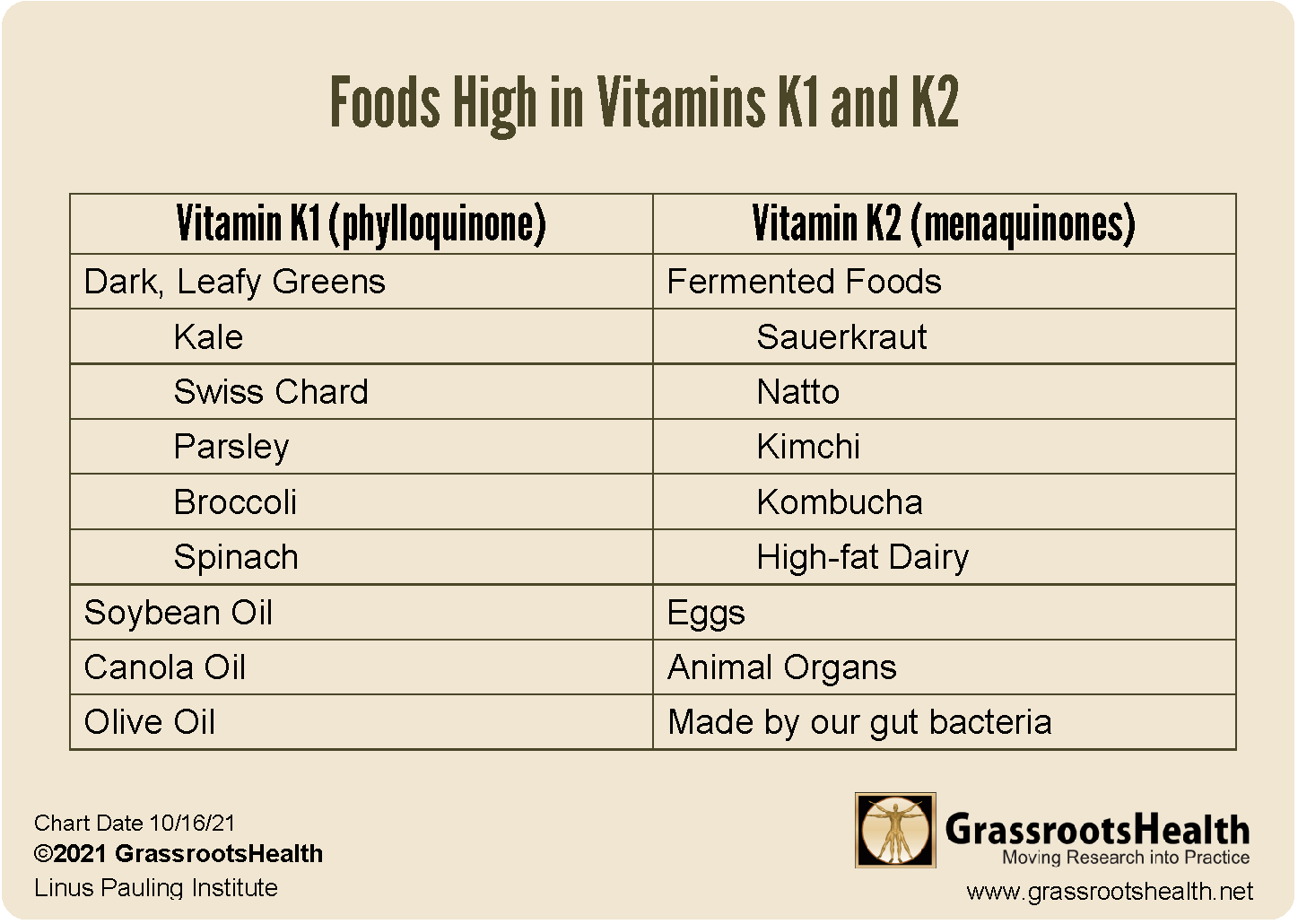 Click to Enlarge & Print
Click to Enlarge & Print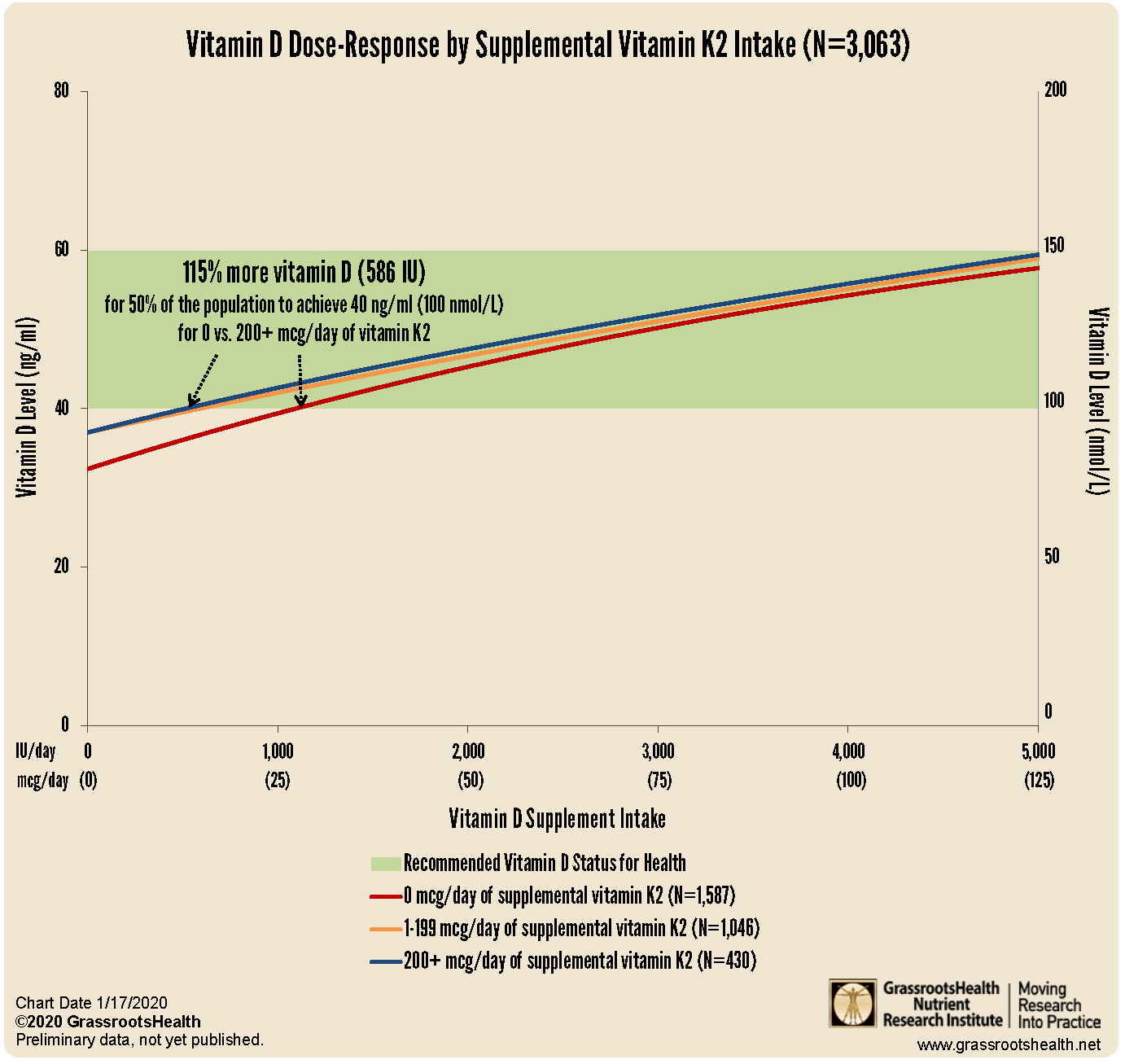 Click to Enlarge & Print
Click to Enlarge & Print
